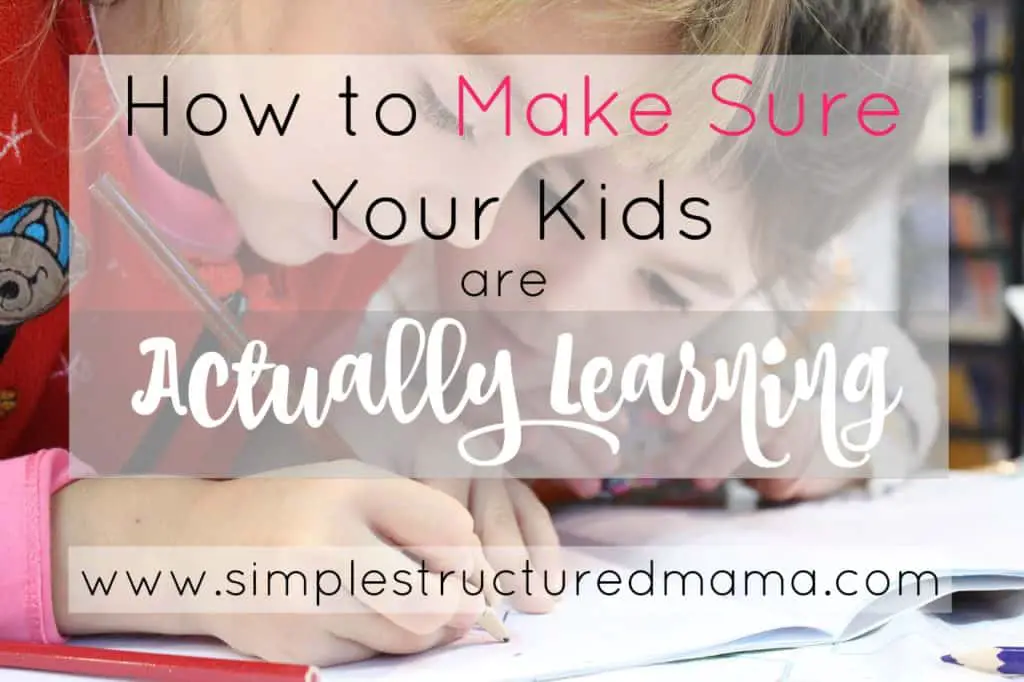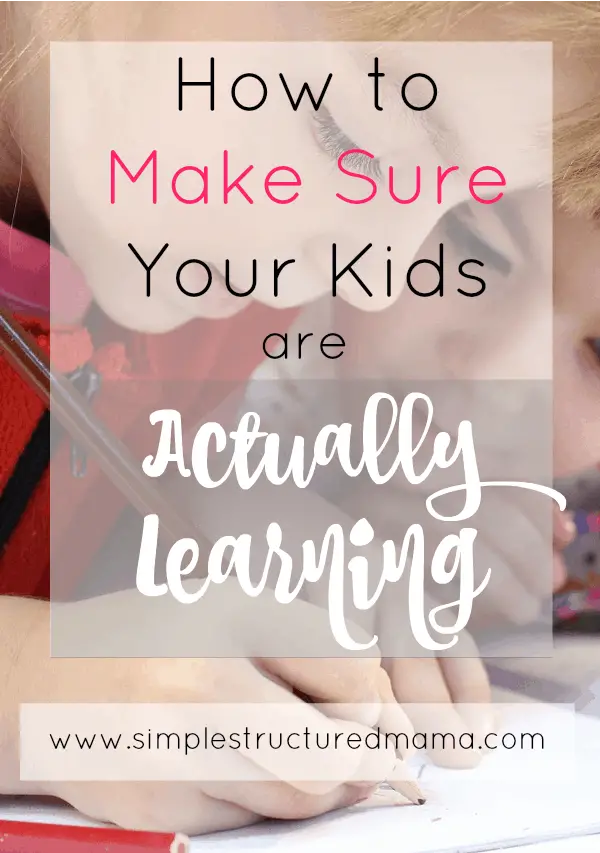
Whether you’re a homeschooling mom or your children go to school, you want to make sure your kids are actually learning the material they’re spending hours studying. But how can you be sure this is taking place?
Let’s backtrack for just a sec. Remember when we were in school? I don’t know how your school experience was, but I know I probably used up 2.1 million sheets of paper doing worksheets, writing reports, and taking tests on various subjects (and all the trees of the field mourned).
However, for all of those years I went to school, I know that if I were to take some of those tests today, I would easily fail. I would even fail tests that I scored perfectly on. And why is that?
Because when knowledge is not applied and integrated into your life, it’s forgotten.
You already know this to be true if you ever took Spanish in high school. Most people I know who have ever taken Spanish 3 and 4 are still not fluent!! I’m like, how does that even happen?!
But it’s simple, really.
In school, you study to get a good grade on the test. This test is supposedly a reflection of how much you’ve learned. But in all reality, it may just be a reflection of how much you managed to cram into your brain at the last minute and accurately report on paper (like it was for me for soooo many tests). So our grades in school were not an accurate reflection of what we actually learned.
But wasn’t that the whole point of going to school in the first place? To learn? So why did true learning take place only some of the time?
When I felt the Lord call me to homeschool my kids, I began to do my research. What I discovered was not only are there more curriculums than I could count, but there are also approaches to teaching that I had no idea even existed.
For example, you have the Montessori style of learning. Then there’s Delayed Academics, Unschooling, and Living Books. There’s also Unit Studies, the Principle Approach, and your traditional textbook/worksheet approach. And I know that there are more I’m forgetting.
I knew I really wanted my kids to learn and not commit things to head knowledge and forget them shortly after. I didn’t want to waste time with endless worksheets and projects that they would only study just for the sake of turning it in to get a grade. I wanted my kids to really learn, and to retain what they were learning.
After extensive researching and praying, I came to the following conclusion about how to make sure my kids were actually learning:
Make sure they’ve mastered concepts before moving on
All training in academic skills should be viewed with the goal of mastery. Math, reading, and writing skills, for example, should all be practiced with the intention of mastering each skill as your child progresses. This way, solid skills are built piece by piece.
I think the prevailing mentality that needs to be overcome is that kids need to complete a worksheet or assignment just for the sake of getting a grade. I think this shortchanges the learning process, both because every child is different and some things take a longer time to learn than others.
I will honestly say that this is much easier to do in homeschooling than in regular schooling. With homeschooling, you can go as fast or slow as you need to, which allows time for your child to really master a concept. And once he or she has mastered it, you can move on to the next thing. In public school, they have to cover so much material that mastery doesn’t always have time to really develop.
When we train for mastery, academic training becomes easier. We can avoid unnecessary and time-wasting assignments that do not produce fruit, and our kiddos can acquire skill in less time.
Spend time diligently assessing their skills
And by assessing I don’t necessarily mean giving them endless tests and grading. I mean continually keeping your finger on the pulse of where they are academically.
For example, if my daughter’s handwriting is messy simply because she’s being lazy, I would require that she rewrite her words until she did it right. This prevents the cultivation of bad habits, which definitely make learning more difficult.
Be encouraging and not demanding/demeaning
We all know that words are powerful, and they can be used for building or for tearing down. I can’t tell you how many students I’ve seen with mental hindrances because either they believe they’re unable to understand things or someone has told them they’ll never be able to.
When kids are trying to learn, we need to give them space to make errors. Use words like “good” and “that’s a really good effort”. I’ve even heard that all kids have an inner genius, but we snuff it out by trying to force them to fit a mold and being discouraging. When we encourage their efforts even in the midst of their failures, it encourages them to do things better!
Make room for their desires
If you’ve ever pursued learning anything on your own, you either did it because you had to or you were interested in the topic. And this interest is what makes the learning process stick!
Since I’ve been a stay at home mom, I’ve extensively pursued furthering my cooking skills. I’ve watched YouTube videos, read cookbooks, and talked to other women who are good at it. I’ve had a desire to be able to cook well for my family, so I pursued the knowledge myself. Because of this, I’ve grown tremendously in this area.
Every person is gifted in some way or form. When we allow our kids to lean into their giftings, they can develop the seeds that are already inside of them and really thrive.
Apply knowledge
Knowledge is gained to be applied. If it’s not used by applying it in real life, it is lost. Or even worse, it just becomes something you just know and you don’t actually do (like reading the Bible for knowledge and not application). We can graduate high school, and even college, with heads full of knowledge gained for years and no real-life application.
It’s not that we should never pick up a book to read anything if we can’t apply it, nor that we can never do worksheets or crafts that we know we probably throw away. We just have to change the way we think about these things so that we can pave the way for our kiddos to have a clear path for true learning!
Related Posts:
12 Things to Teach Your Toddler Starting Today
Repentance: The Goal of Disciplining
15 Quality Time Activities Kids Love
Our Kids Absorb Us (and What We Should Do About It)
How to Help Siblings Stop Fighting
